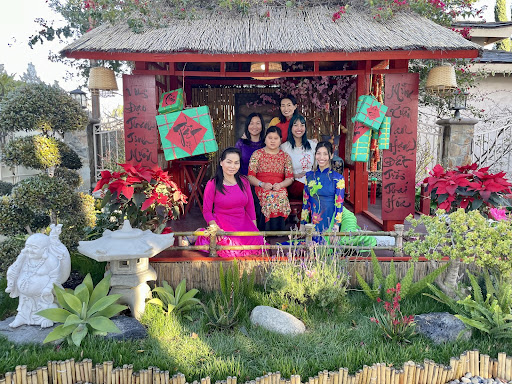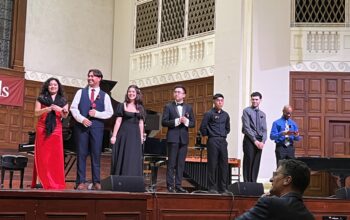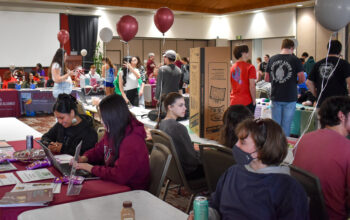Universities across the United States are back in session from the winter break by the time the Lunar New Year rolls around. Here at the University of Redlands, students who grew up celebrating the Lunar New Year are navigating new ways of honoring their cultural traditions while being apart from their families.
The Asian Student Association club held their first meeting of the spring 2023 semester on Wednesday, Jan. 25. There, cabinet members led a presentation about how different countries within the Asian diaspora celebrate the Lunar New Year.
Because most students couldn’t be with their families for the new year, many didn’t celebrate the occasion this year. Some students, such as Alison Hale ‘25 and Emory Ho ‘25 ate foods reminiscent of their familial traditions. Hale and her friends got together to eat “phở,” which is a Vietnamese soup, and Ho cooked beef bulgogi for himself.
Alan Do ‘24 expressed feeling isolated around this time of year because his family is too far north in San Jose, California to celebrate the Lunar New Year with him.
“Not being with the rest of the family during Lunar New Year feels bitter! They’re celebrating while I’m isolated, meaning I don’t get to partake in the annual traditions that I’ve grown so accustomed to,” Do said. “I missed cooking homemade food and paying respects to my ancestors and laughing at family reunions, but they called me to wish me a happy new year, so I’m happy that I got to at least hear from most of them!”
Other students are fortunate enough to have family close to Redlands, such as Mia Lobito, who is from Orange County. Lobito and her family gathered at her grandmother’s house to change into their traditional Vietnamese tunics and pants, “áo dài,” and went to a temple in Little Saigon in the Garden Grove area.
“We walked around, we took pictures, and spent time together, then went inside the temple to pray,” Lobito described.
Traditional Lunar New Year dishes prepared and eaten by Lobito’s family consisted of “gỏi cuốn,” or spring rolls, “bánh tét,” or glutinous rice rolled in a banana leaf into a thick, log-like cylindrical shape with mung bean and pork filling, and “thịt kho trứng,” braised pork belly and eggs.
As part of their Lunar New Year traditions, Lobito and her relatives partook in the traditional ceremony of exchanging money envelopes. The gifting of envelopes with money is a way for family to express gratitude and wish each other prosperity in the new year. Following the ceremony, her family played “bầu cua tôm cá,” which is a Vietnamese gambling game traditionally played during the new year.
Lobito explained that her grandmother spent the entire day preparing vegetarian dishes to place on their family altar as offerings to their ancestors and loved ones who have passed on.
“It’s vegetarian because we don’t offer meat to the afterlife,” Lobito explained.
Additionally, fruits such as oranges and kumquats, and lit incense are placed on the altar alongside their loved ones’ portraits.
Similarly, Dylan Jin-Seok Chae ‘24 offered his ancestors and late loved ones rice, fish, cut fruit, “tteo,” or Korean rice cake, and other side dishes, in honor of the Korean Lunar New Year tradition of “jesa.”
Chae also called his grandparents to perform the Korean tradition of “sebae,” which is the act of bowing to show respect and bless the family for the new year.
“Honestly I wasn’t able to do much because I’m so far away from home (Chicago), but I am grateful I have friends to have a bootleg LNY with lol!” Chae expressed.
2023 marks the Year of the Rabbit, or in Vietnamese culture, the Year of the Cat.
Different from the western, Gregorian calendar, the Lunar New Year is centered on the 12 lunar phases. Each year brings forth a different zodiac animal to symbolize a new cycle.
In Vietnamese culture, the Year of the Cat is a symbol of good luck. During the last Year of the Cat, back in 2011, Vietnam saw a boom in children born. This rise in births was credited to the Year of the Cat’s good fortune.
In other East Asian cultures, this year, the Year of the Water Rabbit, marks an especially important cycle. The rabbit is the fourth zodiac animal on the lunar calendar, but the water rabbit only appears every 60 years. As a result of its rarity, cultures across East Asia consider 60th birthday celebrations to be very special.
The rabbit is a symbol of good luck, as well as intellect, peace, and introspection.
Ayled Zazueta is a senior emphasizing in journalism & perspectives across cultures. She specializes in human interest stories. Her Myers Briggs is ENFJ.




